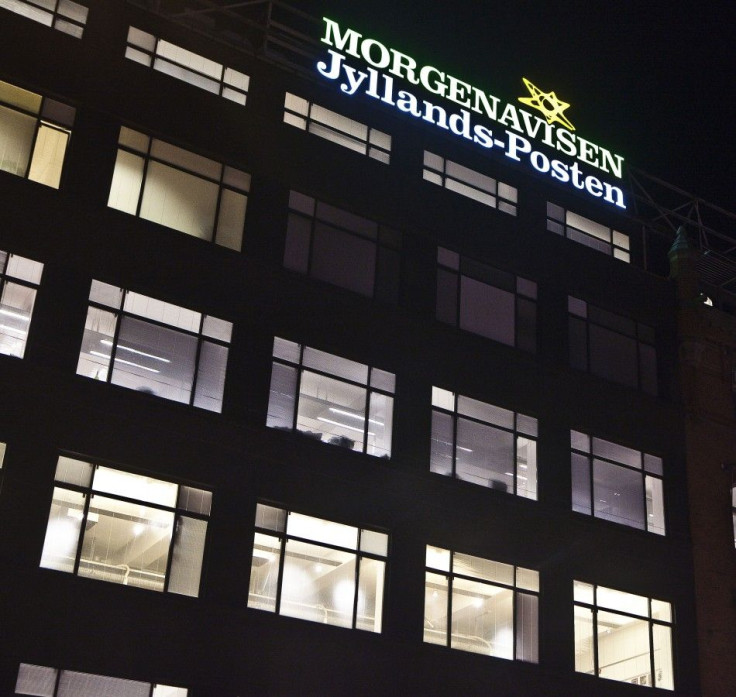Four Deny Plotting Danish Newspaper Attack

A trial began Friday of four men, three Swedish citizens and a Tunisian, who are suspected of orchestrating a failed 2010 attack on the Jyllands-Posten newspaper in the Danish capital of Copenhagen.
They face charges of terrorism and illegal weapons possession, and they could serve up to 16 years in prison if convicted, after which they would be expelled from Denmark permanently.
Jyllands-Posten printed a series of 12 cartoons of the Prophet Muhammad, the holiest figure in Islam, in 2005. News of the images sparked violent protests in Muslim countries and led to the attempted murder of the cartoonist, Kurt Westergaard, by a Somali man in 2010. The attacker was sentenced to nine years in prison last year.
The Danish embassy in Islamabad, Pakistan, was also bombed in 2008, allegedly as retaliation for the cartoons' publication, killing six.
In the current trial, the three Swedish citizens, Sabhi Ben Mohamed Zalouti, Munir Awad and Omar Abdalla Aboelazm, pled not guilty to both terrorism and weapons charges.
Mounir Ben Mohamed Dhahri, a Tunisian national, is on trial for attempted terrorism, as he admitted to illegal weapons charges.
It is our perception that an unknown number of people were to be killed by shooting, lead prosecutor Gyrithe Ulrich told Danish television before the trial.
Three of the men were arrested in an apartment on the outskirts of Copenhagen on Dec. 29, 2010, just three days before they planned to execute the attack. Zalouti was found in Sweden the next day, and he was later extradited to Denmark.
A silencer-equipped machine gun, a revolver, 108 bullets, a large amount of duct tape and $20,000 in cash was found in the apartment, according to Al Jazeera.
Prosecutor Ulrich told the court Zalouti confirmed that the three men arrested in Denmark were indeed planning the attack while under interrogation by Swedish police, Danish broadcaster DR reported.
We had spoken about a possible attack in Denmark, but not that we would carry it out, Zalouti said in court, according to DR. He maintains he parted ways with the group before they reached Denmark.
Swedish and Danish intelligence services worked together to track the men months before their arrest. Prosecutors also claim that the group had ties to Pakistan, but said they would elaborate further as the trial proceeds.
Prosecutors suggest the target of the attack was a ceremony celebrating the Sporting Newcomer of the Year at the Jyllands-Posten building. Danish Crown Prince Frederik was present at the ceremony, along with other sports celebrities.
It appears this event was the target, prosecutor Henrik Plaehn said, according to Jyllands-Posten. The prosecution believes that the men were not aware of the Prince's attendance, however.
Munir Awad, one of the men, was arrested twice previously on charges of terrorism, the Swedish foreign Ministry told AFP last year. Awad was arrested in Somalia by Ethiopian troops in 2007 and in Pakistan in 2009 while traveling with his wife, his son and a former Guantanamo Bay detainee.
Danish authorities claim the men were attempting to orchestrate an attack similar to those that occurred in Mumbai, India in 2008, which left a total of 166 dead.
The trial is expected to conclude in mid-June, after which a speedy verdict is anticipated.
Friday's proceedings serve as a reminder of the outrage expressed towards Denmark in reaction to the 2005 caricatures of Muhammad.
It's a pity that this old story about the cartoons will again be highlighted. I personally think Denmark would like to forget this recent episode in our history, Mette Petersen, a 26-year-old graduate student told the Associated Press.
Others believe the trial will have less of an effect on relations between Denmark and the Muslim world.
I don't think this trial will have the same international impact in the Middle East as maybe it would have had five years ago, Professor Peter Seeberg, head of Middle East studies at the University of Southern Denmark, explained to the AP.
Thankfully, the cartoon crisis is no longer an inflammatory issue, and when I travel to the Middle East now it is hardly ever mentioned.
Denmark's Muslim population was estimated to be 226,000 in 2010, or just over 4 percent of the nation's total, according to the Pew Foundation.
© Copyright IBTimes 2025. All rights reserved.





















